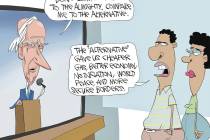Paycheck to paycheck?
The unrelenting economic storm battering the private sector is nothing more than a pleasant summer breeze for this country's federal work force.
A decade of deficit spending has allowed federal workers' salaries and benefits to balloon right along with the national debt. USA Today reported this week that federal compensation has grown 36.9 percent since 2000 after adjusting for inflation, compared with 8.8 percent growth for private-sector workers.
Among the newspaper's other findings, according to the latest data from the Bureau of Economic Analysis:
-- Federal employees' average compensation now more than doubles what the typical private-sector worker receives in wages and benefits. The typical federal worker gets $123,049 in annual compensation, while private-sector workers receive $61,051.
-- Federal workers have been handed larger annual pay and benefit increases than private workers for nine years running. The government-employee talking point that "we didn't get the big raises you got when the economy was taking off" is a red herring.
-- The compensation gap between federal workers and private workers has doubled this decade.
-- Most notably, the average federal worker's benefits package is worth almost as much as the average private-sector salary. Federal worker benefits cost taxpayers an average of $41,791 per employee, with the lion's share of that supporting pensions. The typical private worker makes $50,462 in salary, and $10,589 in benefits. With health care costs still rising and ObamaCare the law of the land, the cost of federal workers' benefits could very well shoot past private salaries in just a few years.
Federal employees like to think that their work is far more demanding than private-sector work, and that their huge paychecks reflect their skills and education. But a separate USA Today analysis, conducted in March, found the federal government pays about 20 percent more than companies do for comparable positions.
And back in December, the newspaper reported that "federal employees making salaries of $100,000 or more jumped from 14 percent to 19 percent of civil servants during the recession's first 18 months -- and that's before overtime pay and bonuses are counted. Federal workers are enjoying an extraordinary boom time -- in pay and hiring -- during a recession that has (through 2009) cost 7.3 million jobs in the private sector."
Bottom line: Your underemployed children, grandchildren and great-grandchildren will be paying for the extravagant, disconnected standard of living enjoyed by today's federal work force. And until Congress gets serious about balancing the federal budget and paying down the $13 trillion national debt -- until the federal govenment faces serious consequences from its creditors -- there is no indication that this insulting largess will be reined in.
"Can't we now all agree that federal workers are overpaid and do something about it?" asked Chris Edwards, a Cato Institute budget analyst.
Alas, federal workers might have to make do with a 1.4 percent pay raise in 2011 -- on top of seniority-based pay hikes, of course.
The taxpaying public is growing wiser to pay and benefits they provide to public employees, but can't get for themselves. It is beyond unfair. It is immoral.























